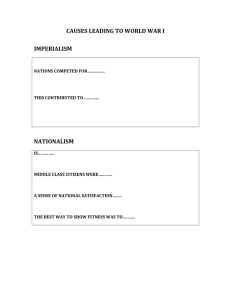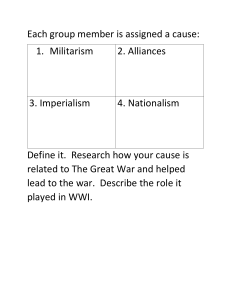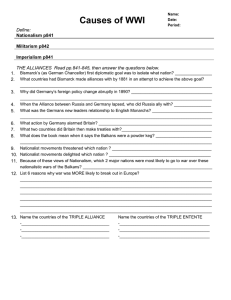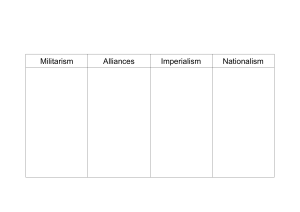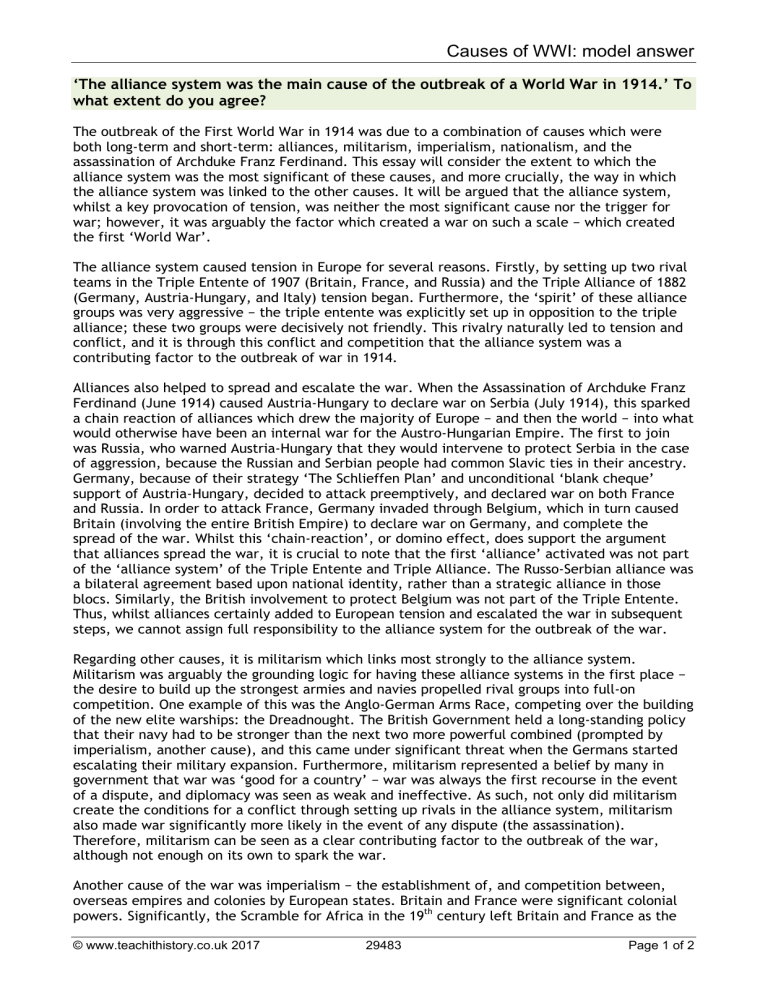
Causes of WWI: model answer ‘The alliance system was the main cause of the outbreak of a World War in 1914.’ To what extent do you agree? The outbreak of the First World War in 1914 was due to a combination of causes which were both long-term and short-term: alliances, militarism, imperialism, nationalism, and the assassination of Archduke Franz Ferdinand. This essay will consider the extent to which the alliance system was the most significant of these causes, and more crucially, the way in which the alliance system was linked to the other causes. It will be argued that the alliance system, whilst a key provocation of tension, was neither the most significant cause nor the trigger for war; however, it was arguably the factor which created a war on such a scale − which created the first ‘World War’. The alliance system caused tension in Europe for several reasons. Firstly, by setting up two rival teams in the Triple Entente of 1907 (Britain, France, and Russia) and the Triple Alliance of 1882 (Germany, Austria-Hungary, and Italy) tension began. Furthermore, the ‘spirit’ of these alliance groups was very aggressive − the triple entente was explicitly set up in opposition to the triple alliance; these two groups were decisively not friendly. This rivalry naturally led to tension and conflict, and it is through this conflict and competition that the alliance system was a contributing factor to the outbreak of war in 1914. Alliances also helped to spread and escalate the war. When the Assassination of Archduke Franz Ferdinand (June 1914) caused Austria-Hungary to declare war on Serbia (July 1914), this sparked a chain reaction of alliances which drew the majority of Europe − and then the world − into what would otherwise have been an internal war for the Austro-Hungarian Empire. The first to join was Russia, who warned Austria-Hungary that they would intervene to protect Serbia in the case of aggression, because the Russian and Serbian people had common Slavic ties in their ancestry. Germany, because of their strategy ‘The Schlieffen Plan’ and unconditional ‘blank cheque’ support of Austria-Hungary, decided to attack preemptively, and declared war on both France and Russia. In order to attack France, Germany invaded through Belgium, which in turn caused Britain (involving the entire British Empire) to declare war on Germany, and complete the spread of the war. Whilst this ‘chain-reaction’, or domino effect, does support the argument that alliances spread the war, it is crucial to note that the first ‘alliance’ activated was not part of the ‘alliance system’ of the Triple Entente and Triple Alliance. The Russo-Serbian alliance was a bilateral agreement based upon national identity, rather than a strategic alliance in those blocs. Similarly, the British involvement to protect Belgium was not part of the Triple Entente. Thus, whilst alliances certainly added to European tension and escalated the war in subsequent steps, we cannot assign full responsibility to the alliance system for the outbreak of the war. Regarding other causes, it is militarism which links most strongly to the alliance system. Militarism was arguably the grounding logic for having these alliance systems in the first place − the desire to build up the strongest armies and navies propelled rival groups into full-on competition. One example of this was the Anglo-German Arms Race, competing over the building of the new elite warships: the Dreadnought. The British Government held a long-standing policy that their navy had to be stronger than the next two more powerful combined (prompted by imperialism, another cause), and this came under significant threat when the Germans started escalating their military expansion. Furthermore, militarism represented a belief by many in government that war was ‘good for a country’ − war was always the first recourse in the event of a dispute, and diplomacy was seen as weak and ineffective. As such, not only did militarism create the conditions for a conflict through setting up rivals in the alliance system, militarism also made war significantly more likely in the event of any dispute (the assassination). Therefore, militarism can be seen as a clear contributing factor to the outbreak of the war, although not enough on its own to spark the war. Another cause of the war was imperialism − the establishment of, and competition between, overseas empires and colonies by European states. Britain and France were significant colonial powers. Significantly, the Scramble for Africa in the 19th century left Britain and France as the © www.teachithistory.co.uk 2017 29483 Page 1 of 2 Causes of WWI: model answer dominant colonial powers in Africa, with Italy and Germany hungry for more. Germany was the key challenger to the established colonial order, and kept pushing for more access to colonies abroad. This did not directly lead to any such conflict, and is arguably the least significant of the causes in bringing about the war itself. However, colonies were the area over which Britain and Germany clashed most often, and arguably a significant contributing factor in their militaristic competition and arms race. As such, imperialism was a significant source of tension, and further encouraged the development of two rival sides in the alliance system. Finally, throughout these other causes, there has been one common thread: nationalism. Nationalism was a pervading cause of the First World War, which draws together all of the other causes: the Russian alliance with Serbia was a nationalist alliance, the nationalist belief in one’s own superiority drove the militaristic arms race, and German imperial ambitions were borne out of Kaiser Willhelm’s nationalist policy of ‘A Place In The Sun’ whereby Germany wanted to have an overseas empire to match her ‘supreme national power’ in Europe. Furthermore, it was nationalism which produced the trigger which definitively sparked the war − it was a Serbian nationalist, Gavrilo Princip, who carried out the assassination. Serbia, as an under-represented part of the Austro-Hungarian Empire, was not content that a Hapsburg (the Austrian royal family) was going to rule over them again − a key nationalist belief is that a country should rule itself. Therefore, the assassination was possibly part of a nationalist plot to free Serbia from Austro-Hungarian rule. As such, not only does nationalism link into militarism, alliances, and imperialism –nationalism caused the assassination which precipitated the entire war. In conclusion, whilst alliances were a key cause of tension, and certainly escalated the war, they were neither the dominant long-term cause, nor the trigger which actually caused war to break out in 1914. Rather, it was nationalism which had the most significant long term effect, and which directly provoked the assassination of Archduke Franz Ferdinand which triggered the war. However, these causes were all linked because it was events such as the arms race and FrancoPrussian War which created the atmosphere of hostility and competition necessary for the alliance system to emerge. Therefore, whilst one can prioritise and analyse the various causes of the war, we may not discount any of them, for it was ultimately this toxic mix of causes which caused the worst war the world had ever seen in 1914. Use colours to identify the following features of this essay: where a judgement is being given (the author is directly giving their decision about the question) where signposts are used (the author is directing you through their essay by referring directly to the question and summarizing where they have got to or are going) where evidence is being provided (the author is giving examples to prove their argument) where links are being made between causes. © www.teachithistory.co.uk 2017 29483 Page 2 of 2

